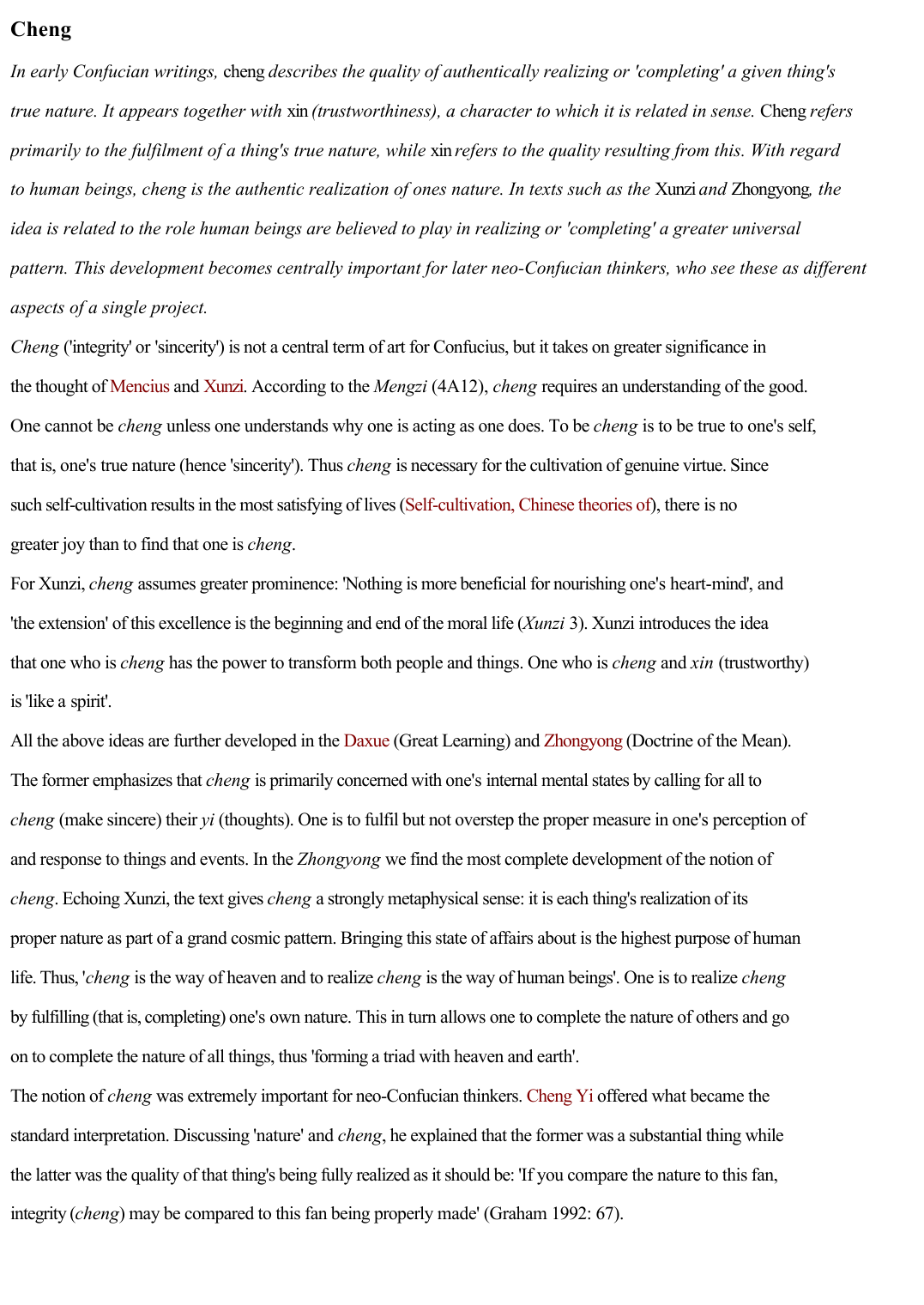Cheng
Publié le 16/05/2020

Extrait du document
«
Cheng
In early Confucian writings, cheng describes the quality of authentically realizing or 'completing' a given thing's
true nature.
It appears together with xin (trustworthiness), a character to which it is related in sense.
Cheng refers
primarily to the fulfilment of a thing's true nature, while xin refers to the quality resulting from this.
With regard
to human beings, cheng is the authentic realization of ones nature.
In texts such as the Xunzi and Zhongyong , the
idea is related to the role human beings are believed to play in realizing or 'completing' a greater universal
pattern.
This development becomes centrally important for later neo-Confucian thinkers, who see these as different
aspects of a single project.
Cheng ('integrity' or 'sincerity' ) is not a central term of art for Confucius, but it takes on greater significance in
the thought of Mencius and Xunzi .
According to the Mengzi (4A12), cheng requires an understanding of the good.
One cannot be cheng unless one understands why one is acting as one does.
To be cheng is to be true to one's self,
that is, one's true nature (hence 'sincerity' ).
Thus cheng is necessary for the cultivation of genuine virtue.
Since
such self-cultivation results in the most satisfying of lives ( Self-cultivation, Chinese theories of ), there is no
greater joy than to find that one is cheng .
For Xunzi, cheng assumes greater prominence: 'Nothing is more beneficial for nourishing one's heart- mind' , and
'the extension' of this excellence is the beginning and end of the moral life ( Xunzi 3).
Xunzi introduces the idea
that one who is cheng has the power to transform both people and things.
One who is cheng and xin (trustworthy)
is 'like a spirit' .
All the above ideas are further developed in the Daxue (Great Learning) and Zhongyong (Doctrine of the Mean).
The former emphasizes that cheng is primarily concerned with one's internal mental states by calling for all to
cheng (make sincere) their yi (thoughts).
One is to fulfil but not overstep the proper measure in one's perception of
and response to things and events.
In the Zhongyong we find the most complete development of the notion of
cheng .
Echoing Xunzi, the text gives cheng a strongly metaphysical sense: it is each thing's realization of its
proper nature as part of a grand cosmic pattern.
Bringing this state of affairs about is the highest purpose of human
life.
Thus, 'cheng is the way of heaven and to realize cheng is the way of human beings' .
One is to realize cheng
by fulfilling (that is, completing) one's own nature.
This in turn allows one to complete the nature of others and go
on to complete the nature of all things, thus 'forming a triad with heaven and earth' .
The notion of cheng was extremely important for neo-Confucian thinkers.
Cheng Yi offered what became the
standard interpretation.
Discussing 'nature' and cheng , he explained that the former was a substantial thing while
the latter was the quality of that thing's being fully realized as it should be: 'If you compare the nature to this fan,
integrity ( cheng ) may be compared to this fan being properly made' (Graham 1992: 67)..
»
↓↓↓ APERÇU DU DOCUMENT ↓↓↓


